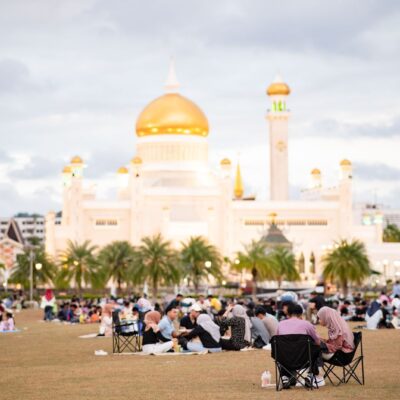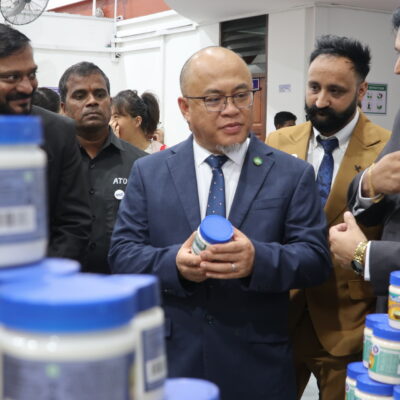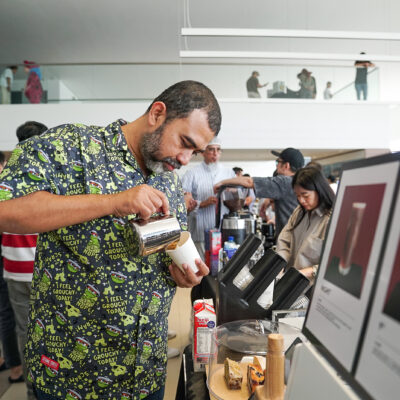Written by Ying Chia |
YAM Pengiran Anak Hamlatul Arsy Mulia is a unicorn — at least that’s her preferred descriptive and after our brief but illuminating char recently, the term is unsurprisingly fitting. From a banking and finance education to immersing herself in the development of her creative skills and businesses, YAM Hamlatul is surprisingly down to earth for someone so young and high-achieving. She shows determination and an incredible amount of discipline towards transforming herself into various roles, and is even less afraid to examine herself from a creative perspective. We talk about needing many hats to wear in this generation, self-reflection and Indonesian dishes with our favourite unicorn.
Can we dive into your career and past as an artist and creative a bit, and your thoughts on the art scene at the moment?
YAM HAMLATUL: I feel like in Brunei there’s not a lot of like opportunities for creative sectors yet but with all the different spots of stuff that are starting to come out. Hopefully, in the next few year it’ll be more vibrant with more opportunities and the younger talent will start to appear. I started drawing and painting at the age of five. My mum was a painter. I saw her paint and was very interested in it, so she actually hired her friend to teach me fine art, and I think it was from then that I started to love it some much. From a young age, I was very exposed to things like fine arts, sculpture and all this stuff. My mum’s friend is also an architect so I was also very inspired by her, and her inspiration as a woman to be able to draw that way. Actually, my mum didn’t want me to be an artist because she know that at that moment in the 80’s or 90’s, an artist career wasn’t something that was successful or feasible. She wanted me to be a banker, you know? So she made me study banking and finance.
I went to University of London and got my degree, but after I graduated, I handed it to her and went on to study animation as an apprentice in Singapore. The mentors and directors in that studio were from Disney. I was there for about three years, and after that I moved to Los Angeles, California around 2010 for another work-study programme where I was mentored by people from Disney, Nickelodeon and all the different industry partners in L.A. That was when I felt like I really wanted to create my own film. I wanted to create my own intellectual property and since then, I actually started writing a story in 2033 together with my mentor and up to now, I’m still writing that story. This year I’m pitching to get some funding to make that story into a 2D animated film. I’m working towards it. But the story that I’ve been working on, I’ve been doing that for 10 years. It’s a story about Brunei, in a sens, but it’s not really just about Brunei. If you’re from there, you will know it’s Brunei but it’s not super literal. What makes it special is that the animation will be 100% hand drawn, hopefully, if I can get the budget for it. I’ve been wanting to do this for a very long time.
On the side, I kept on doing my paintings so along the way I’ve also exhibited in many places. It was first in Brunei; next was in my friend’s San Francisco studio, then Yogyakarta, Indonesia and Perak, Malaysia. So that kind of led towards my journey into meeting new people and networking. At the end of this year, I’m hosting my solo art show with 100 paintings in Singapore. About two years ago, when there was the NFT craze, I had a friend who was in the Blockchain Association in Singapore. He approached me to donate one of my paintings to an NGO in Singapore called GC Trade Income, to raise funds for in-need kids at a school in Singapore. ‘Protectors of the Soul’ kid of raised $50,000, I think?
I look forward to seeing the film when it comes out. You said that the princess in the Protectors of the Soul, which represents you, has her eyes closed because she wasn’t open to a lot of experiences before. Why did you feel that way, and if you can share what were some of the formative experiences that ‘opened your eyes’ ?
YAM HAMLATUL: Okay, so they’re not really fully opened yet. It’s still closed at some moments. It’s kind of like the Lakuh exhibition, right, where you go into a maze with transparent walls and I told you about the idea of that. i think initially when I started drawing, my struggle as an artist was anatomy in the beginning because I couldn’t draw hands and eyes properly. When I was taking anatomy classes in L.A, we had to learn all the different muscles, their names and we had to draw them realistically. When I struggled with it, my mentor told me, “You know when you’re drawing or animating, you have to use your emotions, right? And you have to use your feelings, you know?”. I guess animation is also all about feelings when you are drawing the character, especially if it’s hand drawn, moving across the screen or drawing the character with an emotion, right? Because you have no reference and you have no basis. You have to just draw it in pencil and there’s no computer.
For me, when I was drawing and trying to overcome my struggle as an artist to get better in my skills, I felt like drawing the eyes closed wasn’t just because I had this struggle but because it was also the feeling of me no understanding myself at that moment yet. Life will always be kind of like an uphill and downhill — when you know where you’re going and when you don’t know. So sometimes my eyes are open and sometimes they’re closed. At that moment when I’m drawing them, it’s the feeling of that moment, It’s just like when you close your eyes, you numb your senses to that one area and you focus your senses on something else.
You started the dance company United Network Entertainment and then moved into art, 2D creation and now you’ve got the Curious Playground. What are some of the transferable skills in terms of business that you take along with you?
YAM HAMLATUL: I’ve always had sort of an idea of how I wanted to run the business. Before United Network Entertainment, I also ran another graphic design studio, a small one based in Singapore. But maybe it was too early for me at that moment and I didn’t have much experience to the different aspects of marketing, running a business and finances. The transferable skills were actually learned in Brunei. At that moment when I was doing United Network Entertainment, it probably grew too fast. When I started, it got everybody excited and then it started growing too fast out of my own capacity to run it. I wasn’t ready to handle that amount of skill that was required. Also, at that moment financially-wise, Brunei in 2010, it wasn’t really acceptable. Not really as open as now.
It was also a struggle for me in that sense. I think now it’s better because I think as a business, you need to be in the right place at the right time and also have the people that are ready to receive you and ready to want what you are offering. I think now it’s still in that phase where people are still … Let’s say if I do a course, for example, that cost maybe $500 in Singapore, there will be so many students who will be hungry to go for it. If I were to do it in Brunei, for example, I wouldn’t get the same response. I guess it’s also learning the environment of the country that you’re doing things in because if I were to do it in Singapore, it probably might not work in Brunei and vice versa. I think what I learned was also trying to respect the culture of each place that I’m at. Because when I was networking with people from 22 countries, all of us had the same struggle — and all of us learnt that each country had their own struggle and their own things. For us, we have a lot of restrictions in terms of religion, things we can and cannot do. So being in each country, what I learnt was to not just abide by the rules but also learn the cultural aspects of each country, learn the limitations and how far you can push yourself and how far you can go. So i think also what I learnt was to be successful, is to collaborate more, to network more. Competition is also good, but with collaboration and doing things with more open heart, I think the resources will come to you in that sense.
So, it’s kind of like ‘trust the process’ in a way?
YAM HAMLATUL: Yeah, trust the process and … I mean you can’t just let everything flow, you also have some control of where you’re going, like planning your events ahead. Having a good team is also important; a team that you can trust, that you can depend on, and I think it’s also more important than the money side of things. Ig you have a good team with the same culture and mindset, who’s willing to grow with you. Team building, personal development is also important, I think. Even though people think that you’re good in what you do, there’s always room for improvement. What I emphasise now on my team is to always go for personal development training, whether it’s going to look for it for yourself on YouTube or wherever, or when there’s occasions where I have sessions where they can network with someone that will train them. At least they’re constantly improving themselves and up to date with all the different technology and things going around in our industry.
It was also a good time for me to start Curious Playgrounds, to show people that it’s not just a creative studio but it’s also a studio that wants to grow an individual that’s proficient in language, and also for us to promote the Malay language usage a bit more. Creating an individual that is not just proficient in one thing. For example, I have a dancer I want to train to be able to also make music, for example, or maybe the dancer can also edit a video, or can be a good speaker. They can inspire themselves in that way. Creating an environment where we nurture our individuals in the different fields and they’re able to tap into it, to grow more holistically, with more positivity and less guilt.
So, I feel like this is kind of the age of the multi-skilled person. What do you think about that, comparing it to maybe the previous generation, which seems to have been single-expertise focused?
YAM HAMLATUL: I feel at this age and time, in the dance and animation industries anyway, the talent we train and see is getting younger and younger. My youngest dancer is like five, you know, and she’s already competing. I think if you’re a kid or a young teen or generation at this age, if you don’t kind of explore more skills, you’re left behind. And if you don’t try to reach out to more things to enhance yourself, it becomes a barrier for you to grow and excel further. Especially when you’re out of Brunei. For example, if you come to Singapore, there’s so many young kids now doing the same things that we’re doing now. I think all the Singaporeans, mostly they’re doing upskilling, they’re learning different. I have a friend who’s a lecturer in NTU and she has this student who is a drama teacher, but she’s taking a course in AI and how she can apply AI in her school and classes. So, I think being, not necessarily like a jack of all trades, but using the extra skills that you have to enhance your own set.
You’ve dabbled kind of extensively in all the different areas of creative expression, how would you describe yourself to someone who’s never met you? Would you be like a dancer first and an artist second or the other way round?
YAM HAMLATUL: I got asked this before a few years ago from my friend in San Francisco. I always tell her I’m human first because innately, inside me, I’m already an artist. I don’t measure it whether I’m a dancer first or whatever. I’m a human first, you know, and then as a human you’ve got that innate kind of desire to want to explore and adventure more. Only then you get to be inspired in your work, you know what I mean? For example, I always tell my student to travel more, go out and experience more. And when you do that, you have more things in your mind, in your visual library of information in your head that you can pull from.
It’s the life that you live as a human that makes who you who you are as an artist, dance, whatever, it’s just a label. But I think as one person, everyone’s a human, you know, and the way you live really informs the way you make the things that you make in life. When I’m an artist or painting, I never forget that I’m a dancer. When I’m dancing, I never forget that I’m an artist or animator, because I use the different skills that I have. For example, the strokes in my paintings are also inspired by the choreographies done by my friends and myself, the choreography that I make is also inspired by things I read, by things I look at and experience.
Okay, and you’ve also described yourself as someone with like a penchant for charity and adventure. What are the top three experiences or adventures you’ve had to date? And what’s the next adventure you’re about to embark on?
YAM HAMLATUL: Let’s see. I’ve always had this penchant because my mom built a mini mosque in her village in Indonesia. And ever since I was small, we always visited it once a year to donate to the young kids. They call it the pesantren, which is like an orphanage. Every year, we actually go there and we give them funding to build a school. I think there’s a small religious school there now as well, and a water pump that they can get water from. That was what sparked it all and every time there’s something that’s charitable, I also try to go for it. That’s why I donated my painting to the NTUC Income in Singapore.
I also volunteer at the Singapore Women’s Council here. I do artwork for them. For me, what I’m doing next is trying to create the same environment in Brunei. Starting with the fundraising that I’m doing for the primary school in Kampung Ayu. Initially, the plan was to do just something for Ramadan this year. But I didn’t know how yet at that moment. I actually approached someone that gave me a whole list of beneficiaries. I think there were too many. There were more than 10,000 people and I’m like, ‘Oh my god, I cannot help everyone at one time, right?’ Someone at Majlis Belia and her other friend recommended me to start with one school first. That’s how we ended up with Sekolah Rendah Siamas at Kampung Ayu. In order to see how the first round of fundraising efforts go and the support that we have.
I think being able to do that for Ramadan this year is more like an inaugural event. Where we see how we can run fundraising events in Brunei. Through that, we are also trying to start a youth development fund in Brunei under Curious Playgrounds. Where any events that we do, or things that we do, a certain percentage will go towards this fund. And this fund will provide talented youth in Brunei or those who are outstanding. With funding or opportunities to maybe travel somewhere to showcase their work. Or fund their flight maybe. Or provide them with some subsidy for a future workshop in Brunei. So I think being able to create that environment and a collaboration where people support your event. Knowing that the event is also supporting another creative in Brunei. That is able to reach their dreams. I think that is my future plan at the moment. Yeah, trying to do that.
Okay, cool. I think we’ll circle back to your mum being Indonesian. I’m going to assume that you love Indonesian food – because I don’t know anyone who doesn’t really – what’s your favorite dish and where do you go to satisfy your craving for it??
YAM HAMLATUL: My mum is actually Singaporean. Born in Singapore but she’s Indonesian. I go back every year. She’s from Batam where they do Sundanese food. So naturally, I love that. There’s no place in Singapore that I go for cravings. I have to go back to Indonesia because it doesn’t taste the same (laughs) I think my favorite one – there’s this dish called Ayam Kremes. It’s like the chicken with all the different crispy crumbs on it. I can just eat that with rice and green chili. That’s my go-to dish when I’m back home in Jakarta or anywhere. I will look for that.











